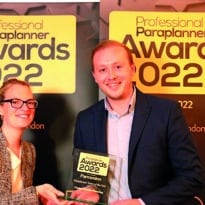Rob Kingsbury spoke to Guy Vanner, managing director, AKG, about the firm, what it does and how it can make paraplanners’ lives easier
AKG is an independent research company which grew out of actuarial roots, and uses actuarial, accounting and corporate finance expertise to conduct analysis on financial services companies.
Its work primarily assesses companies’ financial strengths enabling users of products and services of those companies to delve into their potential longevity and capabilities in their due diligence. It also produces a number of annual reports, its longest standing being on the with-profits market.
Managing director Guy Vanner has been with the Dorking-based company for some 28 years, so is steeped in its culture and capabilities.
“We started with with-profits analysis and from the outset we have always come at our analysis from the perspective of an end customer. We’re looking at whether a business will continue to survive in a format that continues to deliver on the end customers’ expectations. That is not just about capital adequacy and solvency but also on the expectations of operability and service,” Vanner says. “This excludes any policyholder protection policy or ring fencing of assets, because if things go wrong, that would not have been the expectation of the end client and their adviser.”
While producing ratings for companies, AKG’s offering is different to that of a credit ratings agency, Vanner explains. “We’re not interested in the perspective of a debt or shareholder; our focus is on the customer via their adviser and paraplanner and assessing the company with which they are putting their business. That’s because the interests of debt or shareholders are not necessarily aligned with those of adviser firms and their clients in terms of what they want from a company.”
AKG delivers reports and bespoke consultancy on the insurance companies, SIPP providers, friendly societies, platforms and DFMs, and offshore companies selling into the UK market, as well as white papers on the particular aspects of the financial services such as pensions freedoms, MiFID II, and Solvency II.
How the company has approached its analysis has changed over the years, Vanner says, starting out from an actuarial/accountancy perspective that was mainly about numbers and statutory accounts and developing to include qualitative interviews that helps get into the mindset of the companies.
“We still digest reams of numbers and accounts but what differentiates companies is the more qualitative aspects, the more subjective elements around strategy, management and the attitude and commitment of parent companies towards a subsidiary – for example, whether they understand the market it operates in from a regulatory and economic perspective.
“We go beyond the numbers – a full set of accounts is not going to tell you what you need to know about the company from a resilience perspective, for example. Because we have been doing this for many years, we can use our experience of the market and access to companies to look at the numbers going back years and what they tell us, as well as our detailed understanding of the company, its strategies and management structure and style, what it said it was going to do and whether it has delivered on that, who it may be owned by and where their focus is, and so on.”
When analysing a company, Vanner explains, AKG will look at its product mix and assess its financial strength and capability based on the longest term of the product it offers. “We are taking a long term view and to do that we are blending a balanced score card of quantitative and qualitative factors. On the quants side we are looking at, for example, how much capital there is, where it’s held, where it’s sourced from, is there more available from the group or the market, and then how the business is using that capital strategically. Profitability is key but, for example, a business may make a loss one year because they are heavily investing for the future, within a structured plan and set period, which will be to the benefit of the long term health and profitability of the business. That business may be rated higher than another business that is profitable but is stripping cash out. There are numerous factors that have to be taken into consideration.
“On the more qualitative side, we are looking at elements such as management capability, ethos, sense of purpose and culture in the business, strategy and group attitude and focus.”
“On the more qualitative side, we are looking at elements such as management capability, ethos, sense of purpose and culture in the business, strategy and group attitude and focus.”
Given the level of acquisitions that take place in the market, the latter can be significant, Vanner says. “Companies will argue that because they have a large parent company with big balance sheets they should have a higher rating. But if we view the attitude of the parent as not being committed to the subsidiary, that it is under invested in it or might dispose of it in a few years’ time, then we have to take that into consideration in the long term assessment. It can make for some interesting discussions.”
AKG will interview management as high up the chain as possible, Vanner says, “so we can look them in the eyes and ask the key questions that are going to tell us how management thinks and what the real picture is outside of the accounts and numbers.
“Ultimately, you need that full balance of quantitative and qualitative factors to properly analyse, understand and assess a company.”
Conducting due diligence
Asked about when a firm is putting together a list of potential companies whose products and/or services it will use with clients, how can AKG make paraplanners lives easier, Vanner says: “The regulator is encouraging firms to have an audit trail for research and due diligence and to go deep. There are various aspects to any due diligence but corporate longevity and capability is one of the core elements that paraplanners should be investigating.
“Our time and experience in the market means companies do tend to have an open dialogue with us because they can see it is in their interests to do so. This means we can get under the bonnet of a business and inform intermediary firms’ due diligence research by giving them insight they will find hard to do themselves into the companies they may wish to deal with.”
While firms may conduct their own research with companies, dispatching questionnaires (RFPs) to fill in, what they will get back is what the company wants to say to them, the picture it wants to paint, Vanner points out.
“Firms use our information for its independence, to filter down their list from the outset and/or for their more qualitative research.
“Hence, firms use our information for its independence, to filter down their list from the outset and/or for their more qualitative research. What we’re giving people is an independent analysis and rating, consistency of comparison and the flexibility to use our reports and research in the way that best suits their due diligence process.
“Our clear sense of purpose, if you like, is to distil the information and deliver it in a digestible format to help intermediaries know who they are doing business with and to deliver better outcomes for the end clients and customers.”
Further information
Further information on AKG’s reports and consultancy work can be found on its website: https://www.akg.co.uk. Paraplanners may also sign up to a regular Update Newsletter.




























